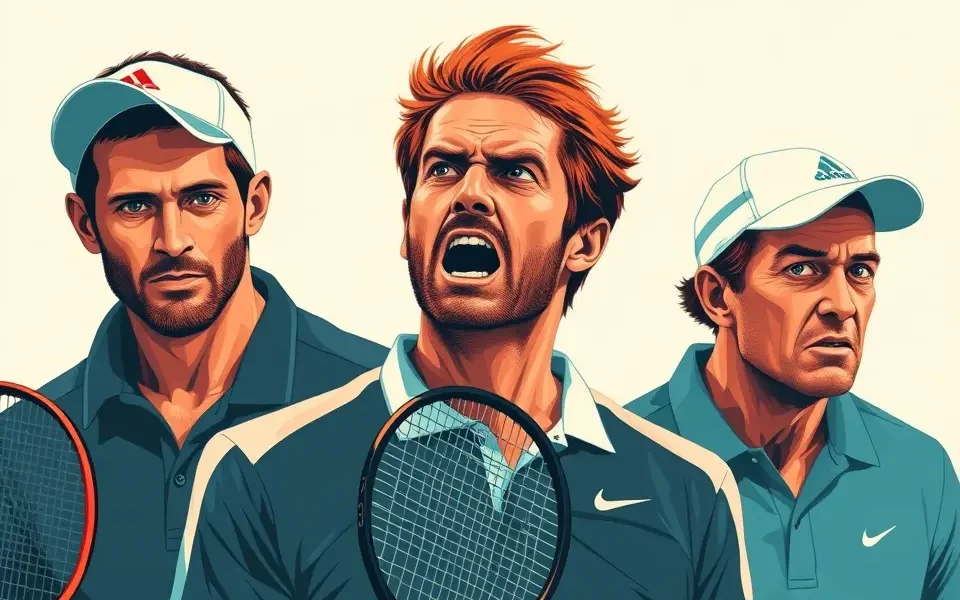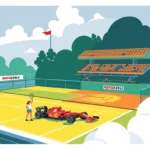In the world of tennis, few rivalries have captured the hearts and minds of fans quite like the epic saga of Roger Federer, Rafael Nadal, and Novak Djokovic. More than just a clash of rackets, it’s a story of contrasting personalities, playing styles, and the ever-shifting dynamics of public perception. While Federer was once the undisputed darling of the tennis world, Nadal emerged as a gritty outsider, and Djokovic, despite his unparalleled achievements, often found himself cast as the villain. This narrative, though simplistic, reflects a complex reality shaped by timing, cultural biases, and the human tendency to root for (and against) certain athletes.
The Reign of Roger: Elegance and Endorsement Deals
For many, Roger Federer is tennis. His graceful style, seemingly effortless shot-making, and impeccable sportsmanship made him an instant icon. Federer didn’t just win; he did it with an elegance that captivated audiences worldwide. This led to his immense popularity and numerous endorsements. As one Quora user put it, “Federer is by far the only tennis player most Americans even know.” He was more than an athlete; he was a brand, a symbol of success and sophistication.
Federer’s appeal extended beyond the court. He cultivated a clean-cut image, stayed away from controversy, and maintained a strong family life. This further endeared him to fans and sponsors alike. His global popularity stemmed from his eloquence, honesty, sense of humor, and graciousness towards his fellow players. He was the role model everyone aspired to be.
The Rise of Rafa: Grit and the Gladiator Spirit
Rafael Nadal burst onto the scene as the antithesis of Federer’s elegance. His aggressive playing style, relentless energy, and never-say-die attitude resonated with a different segment of the tennis fanbase. Nadal was the ultimate fighter, the gladiator who left everything on the court. His rivalry with Federer was one for the ages, a clash of styles that captivated audiences.
Nadal’s popularity also stemmed from his relatability. Unlike Federer, who often seemed like royalty, Nadal was seen as more down-to-earth. He didn’t have a private jet; he flew commercial. He was the “workman-like” champion that ordinary people could identify with. He was the rebel, the one who challenged the established order. This resonated with fans who saw him as an underdog, fighting for every point.
Djokovic: From Challenger to Controversial Champion
Novak Djokovic entered the scene later than Federer and Nadal. He had the misfortune of arriving when the Fedal rivalry was at its peak. Initially, Djokovic struggled to gain the same level of adoration. He was often seen as an outsider, a disruptor of the established narrative. Djokovic had to work harder to earn respect and recognition.
Djokovic’s early career was marked by occasional on-court antics and controversies. He was accused of lacking sportsmanship and being overly aggressive. This rubbed some fans the wrong way and contributed to the perception of him as a villain. As one Reddit user noted, “He’s not as likeable, or at least wasn’t to begin with.”
The “Villain” Era
As Djokovic’s dominance grew, so did the resistance from some fans. He was no longer just challenging Federer and Nadal; he was beating them, often in heartbreaking fashion. This led to resentment from fans who had already invested their loyalty in the established champions. Djokovic became the “bad guy” who was ruining their favorite players’ chances of winning.
Djokovic’s personality also played a role in his image. Some perceived him as aloof, arrogant, and smarmy. Unlike Federer, who was seen as humble, Djokovic was often criticized for being overly confident and boastful. His comments in interviews sometimes put fans offside. Some viewed him as trying too hard to be liked, making him seem disingenuous.
Shifting Tides: Respect and Recognition
In recent years, there has been a noticeable shift in the perception of Djokovic. As Federer has retired and Nadal has battled injuries, Djokovic has emerged as the undisputed king of men’s tennis. His incredible achievements, including a record-breaking number of Grand Slam titles and weeks at number one, have earned him the respect of even his harshest critics.
Many fans have come to appreciate Djokovic’s incredible athleticism, mental toughness, and unwavering determination. He is now seen as a true champion, a player who has overcome adversity to reach the pinnacle of his sport. In some ways, the passage of time and the absence of Federer have allowed Djokovic to gain more fans. There is recognition of his contribution to the sport and new, younger fans getting into tennis see him as the dominant number one and a figure to look up to.
Allegations of Bias
Djokovic himself has suggested that his lack of popularity compared to Federer and Nadal may be due to cultural biases. In an interview, he noted that Federer and Nadal come from “Western powers” like Switzerland and Spain, while he comes from Serbia. He implied that this may have played a role in how fans connected with him.
This is a complex and controversial issue, but it is worth considering. There has always been a bias against Eastern European athletes in some circles. Ivan Lendl and Martina Navratilova, two other tennis legends from Eastern Europe, also faced similar challenges in terms of popularity.
The “Big Three”: A Legacy of Rivalry and Greatness
Regardless of popularity contests, the “Big Three” of Federer, Nadal, and Djokovic have left an indelible mark on the sport of tennis. Their rivalries have pushed each other to new heights, resulting in some of the most memorable matches in history. Together, they have won a staggering 66 Grand Slam titles, dominating the sport for two decades.
Their contrasting styles and personalities have also made them compelling figures for fans to follow. Whether you prefer Federer’s elegance, Nadal’s grit, or Djokovic’s dominance, there is no denying the impact that these three players have had on the game of tennis. They have inspired millions of people around the world and will be remembered as three of the greatest athletes of all time.
The Next Chapter
As Federer has retired and Nadal’s career winds down, Djokovic remains the dominant force in men’s tennis. It remains to be seen whether he will ever achieve the same level of universal adoration as Federer, but his place in history is secure. He is a true legend of the game, a player who has defied expectations and broken records.
The story of Federer, Nadal, and Djokovic is a reminder that popularity is not always the same as greatness. While Federer may have won the hearts of fans, Djokovic has won the most titles. In the end, it is their achievements on the court that will define their legacy. The debate over who is the “GOAT” may never be settled, but one thing is certain: the “Big Three” have given us a golden age of tennis that we will never forget.








No Comment! Be the first one.